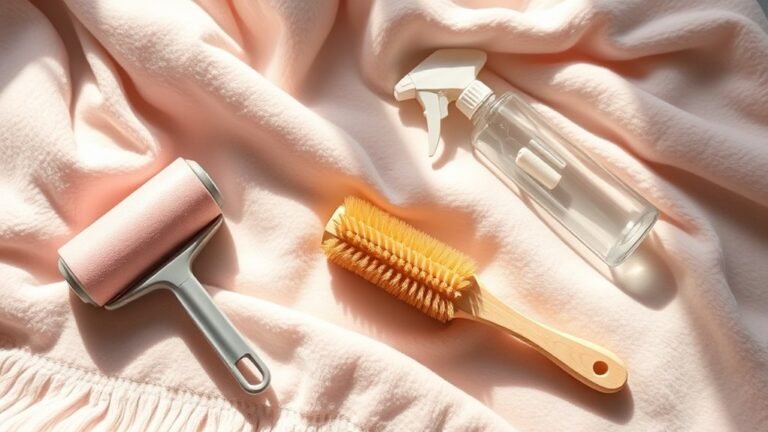Budget-Friendly DIY Cleaning Products for Laundry
You can easily save money and cut chemicals by making your own laundry cleaners using simple ingredients like washing soda, baking soda, grated soap, and white vinegar. These natural items remove stains and freshen clothes without harsh additives. Mixing baking soda in the wash and vinegar in the rinse keeps fabrics soft and clean. Using airtight containers for storage helps maintain your DIY products’ effectiveness. Keep exploring to discover easy recipes and tips for greener laundry days.
Essential Ingredients for Homemade Laundry Detergents

Although making your own laundry detergent might seem complicated, you only need a few essential ingredients to get started. When choosing these ingredients, focus on sustainable sourcing to minimize your environmental impact and guarantee ingredient safety to protect your health. Common essentials include washing soda, which helps remove stains; grated soap, which provides cleaning power; and baking soda, which deodorizes fabrics. By selecting ingredients thoughtfully, you maintain control over what goes into your detergent, avoiding harsh chemicals found in commercial products. This approach not only frees you from relying on store-bought options but also empowers you to create a laundry routine aligned with your values. With a commitment to sustainability and safety, you take a meaningful step toward a cleaner, greener lifestyle.
Simple Recipes for DIY Laundry Detergent
You only need a handful of simple recipes to make effective DIY laundry detergent at home. With just a few ingredients, you can customize scent options and adapt washing techniques to suit your lifestyle. Here are five easy recipes to get you started:
- Washing soda, borax, and grated bar soap mix for a classic detergent
- Liquid castile soap combined with baking soda for gentle cleaning
- Soap flakes, washing soda, and essential oils for a fragrant boost
- Baking soda and white vinegar blend for natural freshness
- Oxygen bleach powder with grated soap for extra whitening power
Each recipe lets you embrace freedom from commercial brands while mastering your laundry’s scent and cleaning style. Experiment with these blends to find your perfect balance.
Natural Stain Removers You Can Make at Home

A few natural ingredients found in your kitchen can tackle stubborn stains without harsh chemicals. By mixing simple, eco friendly ingredients like lemon juice, salt, and essential oils, you can create effective homemade stain removers that save money and reduce waste. These blends work well on everything from grass stains to wine spills, giving you freedom from commercial products full of unknown additives. Just combine equal parts lemon juice and water, add a pinch of salt, and apply directly to the stain before washing. You can also whip up a paste using baking soda and water for tougher spots. Making your own natural stain removers lets you control what touches your clothes and the environment while keeping your laundry routine simple and safe.
How to Use Baking Soda and Vinegar in Laundry
Building on natural stain removers like baking soda paste, combining baking soda with vinegar can boost your laundry’s freshness and cleanliness. You’ll love the baking soda benefits—it neutralizes odors and softens fabrics—while vinegar properties help break down residues and brighten colors naturally. Here’s how you can use them:
- Add ½ cup of baking soda to your washing machine drum with your clothes.
- Pour 1 cup of white vinegar into the fabric softener compartment.
- Let the vinegar work its magic during the rinse cycle.
- Avoid mixing them directly to prevent fizzing outside the washer.
- Enjoy fresher, softer clothes without harsh chemicals.
This combo keeps your laundry routine simple and free, giving you control over what touches your skin and the environment.
Tips for Storing and Using Your DIY Cleaning Products

Since DIY cleaning products often contain natural ingredients without preservatives, it’s important to store them properly to maintain their effectiveness and safety. Use airtight storage containers, preferably glass or high-quality plastic, to prevent contamination and degradation. Label each container clearly with the contents and preparation date, so you know when to refresh your solutions. Keep your products in a cool, dark place to slow down any natural breakdown.
To get the most out of your homemade cleaners, incorporate them into your regular cleaning schedules. This helps you use them efficiently and avoid letting them sit unused for too long. By organizing your storage and sticking to a routine, you’ll enjoy the freedom of effective, budget-friendly laundry care without waste or hassle.
Benefits of Switching to Homemade Laundry Solutions
Proper storage and regular use of your DIY cleaning products set the stage for enjoying their full benefits. When you switch to homemade laundry solutions, you gain freedom from harsh chemicals and expensive store-bought brands. You’re choosing eco friendly options that reduce waste and protect the planet. Plus, you’ll notice real cost savings on your household budget. Here’s what you can expect:
- Gentle yet effective cleaning without toxins
- Reduced plastic waste with reusable containers
- Control over ingredients, tailoring to your needs
- Significant savings compared to commercial detergents
- Satisfaction from creating your own sustainable products
Frequently Asked Questions
Can DIY Laundry Detergents Cause Allergies or Skin Irritation?
You might wonder if DIY laundry detergents can cause allergy symptoms or skin sensitivity. They can, especially if you’re sensitive to certain ingredients like essential oils or baking soda. Since you want the freedom to choose what touches your skin, it’s smart to test any homemade detergent on a small patch of skin first. That way, you can avoid discomfort and enjoy your laundry routine without worries.
How Effective Are Homemade Products on Tough Odors?
When tackling tough odors, you’ll find homemade products can be surprisingly effective, especially when you use specific odor elimination techniques like baking soda, vinegar, or lemon juice. While their effectiveness might not always match commercial detergents, many people appreciate the freedom to customize scents and ingredients. If you’re comparing effectiveness, you might notice homemade options work best with consistent use and proper soaking, giving you a natural, budget-friendly alternative without harsh chemicals.
Are DIY Laundry Products Safe for All Washing Machines?
You’ll want to check safety guidelines before using DIY laundry products, as not all are suitable for every machine. Some homemade mixtures might harm delicate parts or void warranties if they cause buildup. It’s smart to confirm washing machine compatibility by consulting your manual or manufacturer. This way, you get the freedom to experiment with your cleaning routine without risking damage or performance issues. Stay safe and enjoy your laundry adventures!
Can I Add Essential Oils to My Homemade Detergent?
Did you know that 90% of people prefer natural scents over artificial ones? You can definitely add essential oils to your homemade detergent to enjoy essential oils benefits like antibacterial properties and a personalized fragrance. Just be mindful of scent preferences—start with a few drops to avoid overpowering your laundry or irritating sensitive skin. This way, you get fresh-smelling clothes while keeping your cleaning routine free and natural, exactly how you want it.
How Eco-Friendly Are These DIY Cleaning Products Compared to Commercial Ones?
You’ll find that DIY cleaning products usually have a lower environmental impact than commercial ones because you control ingredient sourcing and avoid harmful chemicals. When you pick natural, biodegradable ingredients, you reduce pollution and waste. Plus, making your own lets you cut down on plastic packaging. It’s a freeing way to care for your laundry and the planet, giving you more control over what goes in and out of your home.






